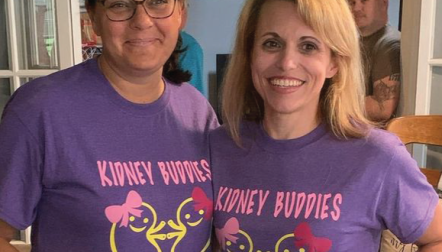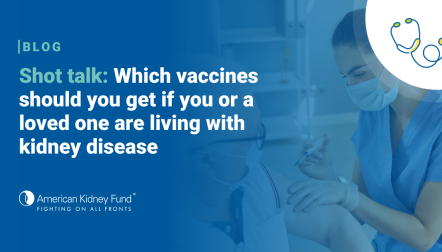
Blog post
Fighting COVID-19 while protecting my transplant recipient husband from it

My husband, Mike, received the gift of life on October 5, 2011, when a friend from high school came forward to be his living kidney donor. For the most part, the past nine years with his new kidney have been uneventful, aside from two rejection scares early on and a bout with pneumonia in 2014. We have been very careful to keep him healthy ever since he came home with his new kidney because he is on immunosuppressive drugs to protect his transplant. I am grateful that he has been able to live a very normal life since the surgery.
Then the COVID-19 pandemic hit the U.S. and came right to our doorstep.
Like everyone else, we were not sure how serious COVID-19 was at first, but I made the choice to enforce strict household rules from the start because of Mike's compromised immune system. When they put us all on lockdown here in Kentucky, we took quarantine seriously and stayed home for three months. We live in the country outside of Louisville, which means we are lucky to not be in a heavily populated area and can go outside for hikes without having to worry about catching germs from others. Fortunately, Mike was also able to continue working from home.
We stayed away from all our grown kids who do not live at home anymore. We did not get to see our grandbabies until the first week of June. Once some of the lockdown restrictions were lifted over the summer, we slowly started visiting our three sons and grandchildren every couple of weeks, as they had been quarantining and practicing social distancing. We wore masks while out in public and had an uneventful June and July. We have a couple of August birthdays in my family — mine and our middle son's — so we celebrated with an outdoor cookout at another son's house.
The morning after the cookout, I received a phone call from my son's fiancée telling me she was symptomatic. Everyone's first concern was Mike. I told her and my son to get tested, which they did — the results were positive for COVID-19. My son remained asymptomatic, but his fiancée had chills, a fever and flu-like symptoms. The very next day, I had congestion in my chest, which rapidly got worse. I was tested twice, but the results of the first test were inconclusive. The people at the testing center told me I needed to quarantine as if I had received a positive result because the tests are sometimes inaccurate. My second test was positive.
I was scared to death about Mike catching COVID-19 from me. I called his transplant surgeon, who told me to stay in our guest room with the door shut and to use a separate bathroom from Mike. Living with an immunocompromised person, I am used to staying in the guest room whenever I feel sick if there is a chance I may be contagious. We also decided for Mike to move out of our bedroom and into a room on the opposite side of the house, to get an even safer distance between us.
During the time I was confined to our guest room, I was getting worse. My cough was different than bronchitis, which I have had multiple times before. The lower part of my body, from the ribs down, was so sore and weak, I felt like I was paralyzed. I could not get up the energy to cough hard enough to get the fluid out of my lungs. I could not walk and had to crawl to get to the bathroom. My tongue and mouth were raw, and I couldn't smell or taste anything, so I had no appetite. It was awful.
The tables had turned in our relationship during the pandemic — Mike was now my caretaker while I was sick. He would leave soft foods and beverages for me outside the guest room door, and I would put everything back outside the door after I was done so he could collect it. It was sort of like room service in my own home, except Mike waited for a day or two before picking up everything to make sure none of my germs lingered on any of the dishes.
After five days of barely any sleep and feeling like I was dying, I called my internist, who prescribed me Levoquin, strong steroids and codeine cough syrup. He made me promise to go the emergency room if I did not wake up feeling better and/or if my breathing became more labored. Mike picked up the prescriptions and left them outside the door for me. I fell asleep around 7 p.m. on a Friday and did not wake up until about 1 p.m. the following Sunday. Mike said he would crack open the guest room door while holding his breath and wearing a mask to make sure I was still breathing and not in a coma. When I woke up, I thankfully was a lot better, though was still very sick for the remainder of August. I had also added injured ribs to the list of my symptoms — I hurt them from straining to cough so much. I would not wish COVID-19 on anyone!
The best news is that Mike did not catch COVID-19 from me the whole time I was sick. I attribute Mike's health to us completely social distancing from each other in our home, having hand sanitizer in every room, washing our hands constantly and wearing masks any time we came in the vicinity of one another, such as when I would leave the guest room to go to the bathroom or when he would bring food to the outside of my door. I also believe God has carried us through all along.
I finally received a negative COVID-19 test Labor Day weekend, so we have been getting back to relative normal since then.



